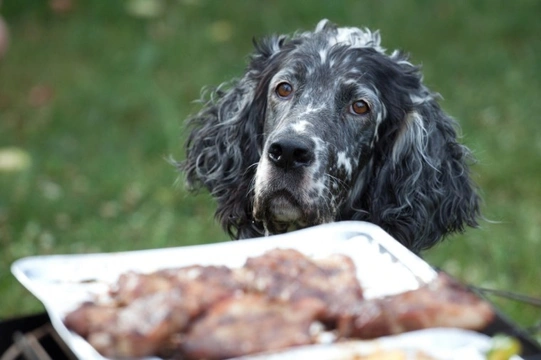
Five seemingly safe barbecue foods your dog shouldn’t eat
As summer eventually begins to show signs finally arriving here in the UK, many of us plan to roll out the barbecue as soon as there’s a break in the weather or a bank holiday weekend rolls around, and this is a great way to spend time with family and friends enjoying good food and the best of the British summer.
As you might expect, dogs are big fans of barbecues too and will often be very vigilant about supervising the chef at work, or rather, hoping for a dropped scrap or somebody to slip them a tasty morsel!
Giving dogs a lot of human foods isn’t a good idea in general, as they don’t contain the right nutritional balance for dogs, can cause them to pile on the pounds, or may be outright toxic. That said, it is really a little but mean to enjoy a whole feast of barbecued meat with your family without allowing your dog to have even a small treat of their own – and few of us can resist giving in to those begging eyes at some point!
However, if you do want to share a treat from the barbecue with your dog, you should think carefully about what you give to them and how safe and suitable it is, and make yourself aware of foods and products to steer clear of, because they might be bad for or even toxic to your dog.
Additionally, dogs are often great at scavenging and stealing food from barbecues when you’re not paying attention, which can happen easily when everyone is chilling out and having a drink, so bear this in mind and appraise yourself of bad barbecue foods for dogs before you start making up a plate for your canine companion.
In this article we’ll share five seemingly safe and harmless barbecue foods you shouldn’t give to your dog, and explain why they can be a problem. Read on to learn more.
Readymade hamburgers
Hamburgers are essentially made out of ground mince, and whilst this is obviously not something that should make up your dog’s staple diet, it sounds as if it should be safe to feed as a treat.
If you make your own hamburgers from scratch at home or check the ingredients within shop-bought ones carefully, a little hamburger meat should be ok to feed to your dog – but proceed with caution.
Most readymade hamburgers are seasoned with onion and/or garlic, both of which are toxic to dogs, and should never be given to them in any quantities.
Coupled with this, hamburgers of all types are high in fat, and just one hamburger probably contains more calories than a whole portion of one of your dog’s regular meals unless your dog is medium to large in size.
Skewers of meat
Meat skewers are great for barbecuing and give a lot of options in terms of meat choices and flavours, but these too are often heavily seasoned with garlic or onion, and often have onion slices on the skewers too. They also tend to be high in fat.
However, the main issue here, even if you are vigilant about what is in the meat and on the skewer itself is the wooden skewer holding it all together, which your dog isn’t going to remove before eating!
If you are eating skewers of meat from your barbecue, make sure you discard the used skewers themselves carefully, as dogs will often scavenge for these and chew them, risking splinters and punctures.
Pork or lamb chops
Pork or lamb chops on the bone are very fatty, which is not good for dogs and again, may be seasoned with something toxic. However, it is the bone itself that is the main problem here, and cooked bones are more brittle and prone to splitting and shattering than raw bones – which is why feeding a properly planned raw meaty bones or BARF diet is safe for dogs, but feeding cooked meats on the bone is not.
If you remove the bone and trim the fat, an unseasoned lamb or pork chop would be fine for your dog, although there is very little actual lean meat left on them once you have done this!
Chicken on the bone
Most of us know that chicken bones are a problem for dogs, as these bones are not only fragile and prone to splitting like all other cooked bones, but also very small too and so, additionally risky.
Chicken wings are popular barbecue fayre and the discarded bones tend to end up all over the place, so make sure there is somewhere for people to dispose of these in safely, where the dog cannot find them or go bin-mining!
Other forms of chicken on the bone like breasts, thighs, legs and wings should be kept away from your dog too – remove the meat from the bone (and ideally, the calorie-rich skin too) before giving them to your dog as a treat.
Take care with vegetarian/vegan foods
More of us are eating a full or partial vegan or vegetarian diet today than ever before, and it is also a lot easier to find ready made and pre-prepared veggie and vegan food in supermarkets too, including those designed to put on the barbecue.
However, don’t lose sight of the fact that some fruits and vegetables are toxic to dogs (like the aforementioned onion) and that when to comes to prepared products, seasonings and other ingredients may carry hidden risks too.
Not all nuts are safe for dogs, and avocados are another potential risk, so never assume that just because something is plant-based that it is good for or even safe for your dog – always check it out first, and read the full ingredients list of pre-prepared vegetarian and vegan barbecue foods carefully.



